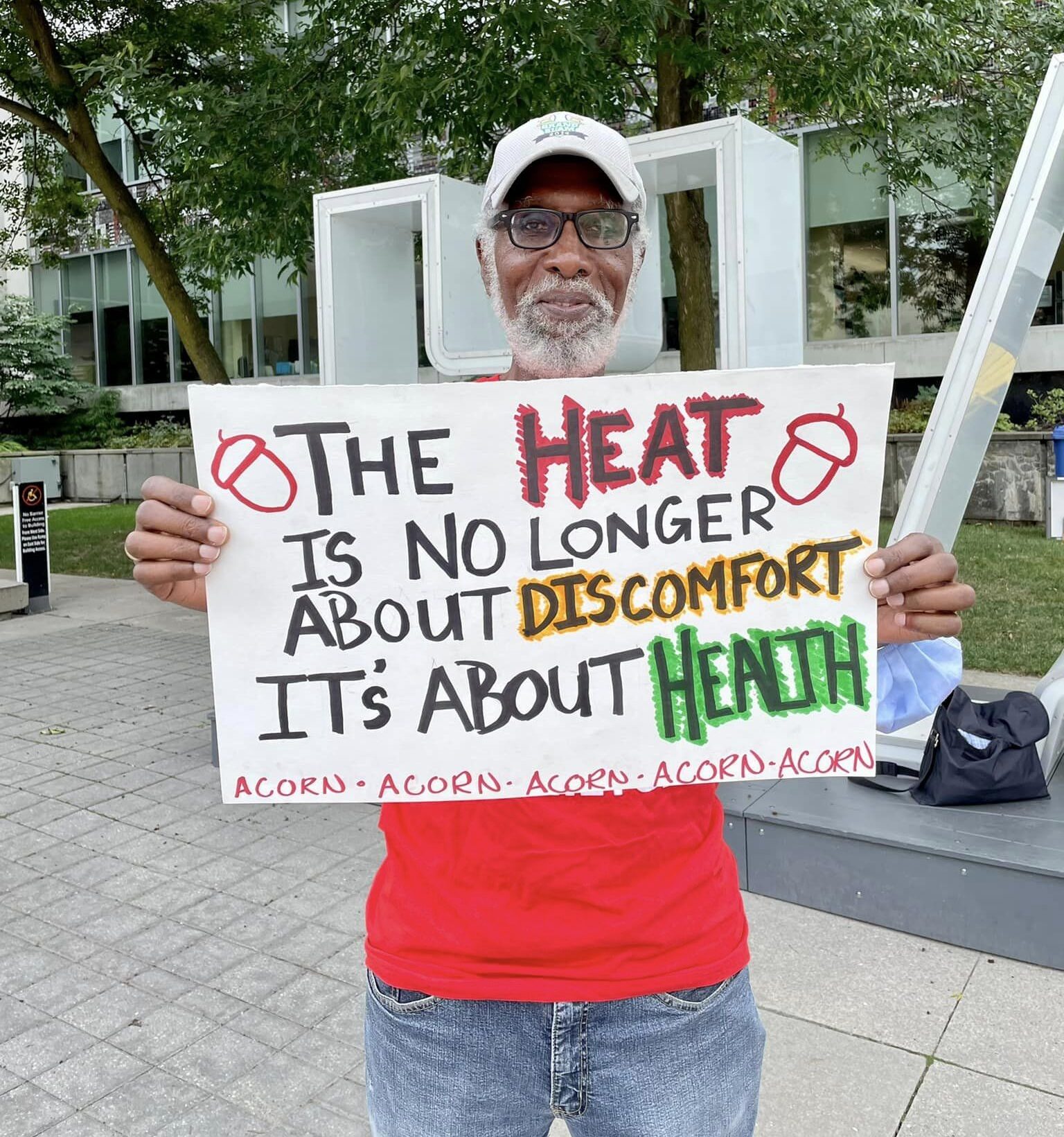When organizers from ACORN Canada speak with tenants, climate justice doesn’t often come up in conversation, at least not explicitly. And yet the issues people raise — drafty windows, poor heating and cooling, and buildings in need of repair — not only negatively impact tenant experience and health, but also harm the environment.
ACORN (Association of Community Organizations for Reform Now) Canada is a nation-wide community union of low- and moderate-income people with 177,000 members in nine cities. Through the support of the McConnell Foundation, other funders and the community itself, ACORN empowers local leaders across Canada to organize tenants so they can advocate for their rights with landlords, corporations, and politicians.
“Our leaders are keen to figure out how to systemically address climate justice for both housing and environmental reasons,” says Judy Duncan, who founded ACORN Canada in 2004. In addition to its local chapters, ACORN has several eco-tenant unions which focus on advancing improvements in their buildings and cities that are a win-win for tenants and the environment.
The buildings sector is the third-largest source of greenhouse gas emissions in Canada. Older apartment buildings are a prominent culprit. “These buildings are bad for the environment and they’re where our members tend to live because they’re typically more affordable,” explains Ashley Reyns, ACORN’s Ontario Regional Director. “Tenants really struggle to get repairs done.”

Tenants from Canadian Apartment Properties REIT buildings in Ottawa vote to form an eco-tenant union through ACORN in their neighbourhood.
Unintended consequences of energy efficient upgrades
As all levels of government aim to address the climate crisis, retrofit funding programs are becoming a common way to direct public money towards energy efficient upgrades in homes and multi-unit residential buildings.
But tenants don’t always benefit when their building is upgraded. In fact, ACORN organizers have witnessed the opposite: landlords using retrofits to justify dramatically raising rents or to renovict tenants. In some cases, tenants shoulder the costs of retrofit projects, despite a landlord having received federal grants or low interest loans.
“As we see funds go from governments to green upgrades, we need this money to have certain safeguards in place,” says Bhumika Jhamb, Research and Communications Coordinator with ACORN.
ACORN’s national housing platform calls for the inclusion of affordability and anti-eviction covenants in all retrofit programs. These legal clauses would help ensure energy efficient upgrades don’t inadvertently lead to ballooning rents and renoviction notices for tenants.
Such policy changes happen on a city-by-city basis. Supported by the national ACORN team, local leaders and eco-tenant unions apply as much pressure as possible in their municipality, though progress ultimately hinges on the receptiveness of politicians and other stakeholders.

An attendee from a maximum heat bylaw demonstration in Hamilton, Ontario. A national ACORN Canada survey found that 80% of tenants are extremely concerned about rising heat in their apartment unit.
Advocating for extreme heat bylaws
One issue at the climate-housing justice intersection where ACORN organizers have made headway is in drawing attention to the impact of extreme heat on tenants. With summer temperatures intensifying, in 2023 ACORN released a national report looking at how these conditions jeopardize tenant safety.
In the report, 79% of residents said they were impacted by extreme heat, with nearly half unable to access air conditioning at home. Tenants pointed to cost, lease restrictions, and landlord objections as three of the reasons for not having a cooling unit installed.
ACORN says retrofitting apartment buildings with energy efficient heat pumps could vastly improve the situation. Heat pump technology consumes less energy to cool and heat units, which lowers energy bills and makes temperatures more comfortable and safer for tenants.
As a result of advocacy from ACORN and other groups, maximum heat bylaw campaigns have been launched in Hamilton and Toronto. Such a bylaw would require landlords to ensure that unit temperatures don’t exceed 26 degrees Celsius. Though not yet passed, the bylaw campaigns have generated interest among city councillors and elevated public concern.
It’s incremental policy changes like this that give ACORN staff the optimism and energy to continue their important work. “When it comes to the positive changes we’ve seen, it’s never because the government just wakes up one day and decides to do it,” says Reyns. “It’s always been a result of collective action and organizing from ACORN members and our allies. Being persistent pays off.”

